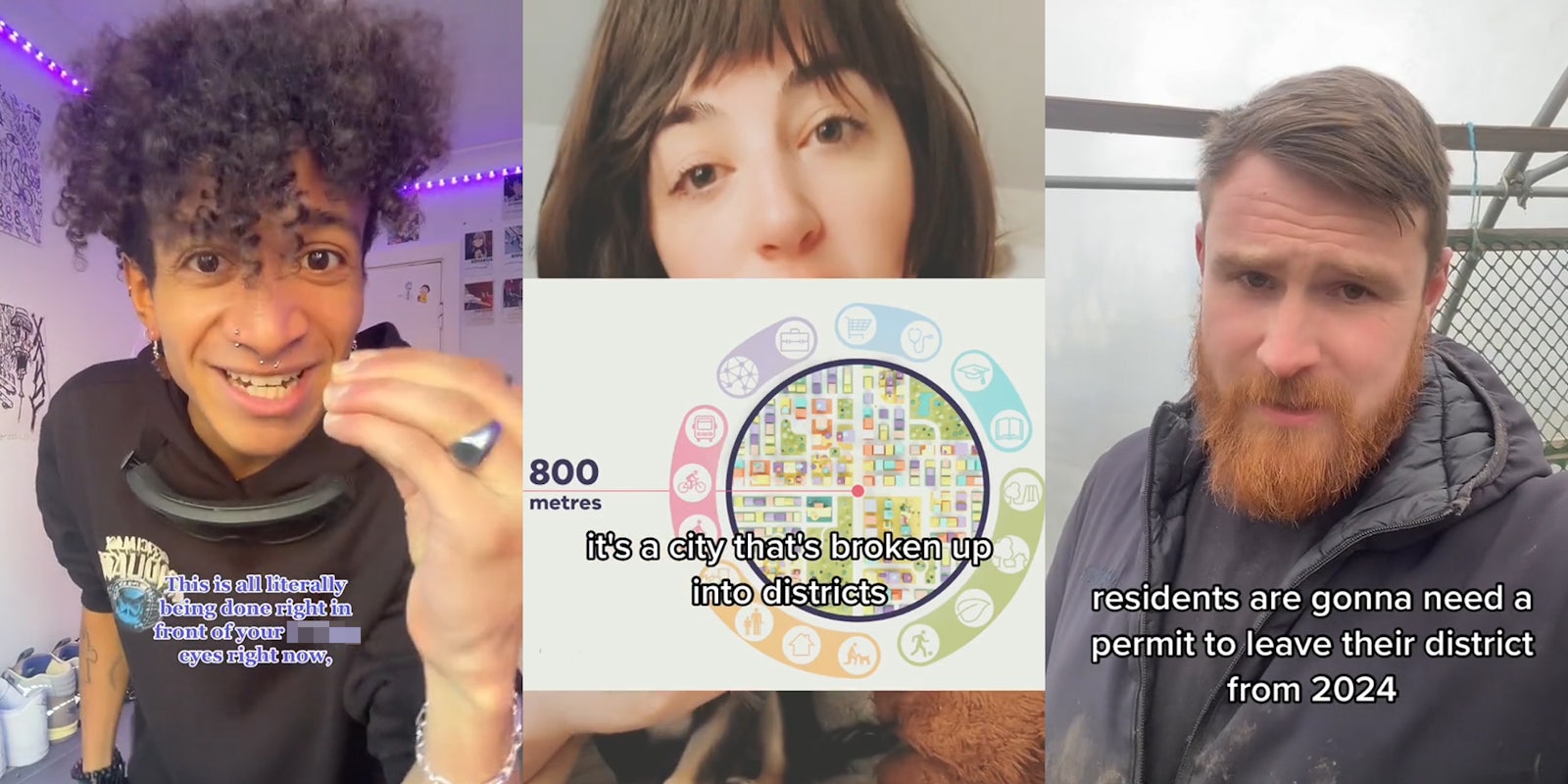“Walking around my old college campus, it’s so apparent that much of the longing that adults feel for their college days is because it was the only time in their lives when they lived in close-knit, walkable communities, saw friends everyday, rarely got into cars.”
Posted last year, this viral tweet from PhD student Joey Miles exemplifies the public conversation around walkable communities. A lot of people feel isolated and exhausted by the practicalities of urban life: Long commutes, food deserts, and a lack of interaction with neighbors.
In simple terms, it would be better for people’s mental health if cities were redesigned to reduce driving. It would also be a lot better for the environment, reducing carbon emissions by changing people’s lifestyles. One version of this idea is the “15-minute city,” where everyone lives a 15-minute walk or bike ride away from their workplace, leisure activities, schools, and shops.
However, this seemingly banal urban planning philosophy has sparked a conspiracy theory that 15-minute cities will be more like prison camps, scaremongering about the possibility of “climate lockdowns.”
This theory posits that the government wants to restrict every aspect of urban life, taking away people’s freedom to travel. There’s a lot of overlap with antivaxxer beliefs, like this guy who says vaccine passports and walkable neighborhoods are both examples of the Canadian government trying to control “all of our movement and activity”:
Over the past couple of months, conspiracy theories about 15-minute cities have gone viral in the UK—although this movement is also spreading in the U.S. and Canada, as some city governments (like Cleveland, Ohio) announce plans to make neighborhoods more walkable. Edmonton is at the forefront of this backlash in Canada, with town planners having to debunk misinformation like a TikTok theory about people getting banned from eating beef if they drive too much.
In the UK, several towns have pitched the idea of adopting a 15-minute model. Oxford is the headline example, leading to IRL protests and five arrests last weekend.
At present, Oxford’s 15-minute city plan is mostly theoretical: A long-term goal to revamp the city before 2040. However, protesters have conflated this with Oxford’s new traffic-reduction scheme, which attempts to make the streets more welcoming to pedestrians and cyclists. This already led to people vandalizing traffic barriers last year, to “free” the streets for drivers.
While this conspiracy theory tends to skew right-wing—especially among media pundits and elected officials opposing “socialist” urban planning measures—it’s attracted supporters from across the political spectrum.
For instance, one TikToker racked up 900,000 views while blaming 15-minute cities on the UK’s Conservative government, comparing the situation to Black Mirror. “You’re gonna have to apply for a fucking permit to leave your zone,” he explains. “It means if you want to go up to fucking Scotland to visit Aunty Susie… Oh, you need a permit to do that!” (To be clear, this isn’t true.)
@itsxeo u guys been asking me to talk about this for a while… here ya go!! #uk #politics #ukpolitics #uknews #15minutecities #conspiracy #xandem ♬ original sound – xeo
The people protesting against 15-minute cities envision a dystopian state where people are banned from leaving their “zone” without government permission, often tying in with the idea of mandatory vaccine passports. (Given the UK government’s palpable disinterest in COVID safety measures, this detail is particularly implausible.)
There’s also a lot of concern over digital surveillance, voicing fears about Western cities adopting China’s social credit system. These people believe that 15-minute cities will involve citizens being tracked by facial recognition software and government-issued ID, to punish rule-breakers and stop people leaving their zones.
@megannesbitt06 breaking news this justin #rudemegz ♬ BioTekal Folsom Prison Blues Wrath of man – Gatsby
In Oxford, this backlash focuses on the council’s anti-congestion plan, which does involve dividing the city into zones. But the rules are nowhere near as draconian as the conspiracy theories suggest. The goal is to reduce carbon emissions and traffic congestion by encouraging people to walk, cycle, or take public transport—a particularly desirable outcome in a small city whose streets were designed for medieval traffic.
Under Oxford council’s proposal, drivers can use their cars whenever they like in their own neighborhood, but there’s a limit on how much they can drive in other zones: 100 days per year. Otherwise, people are encouraged to walk, cycle, or take the bus. This plan doesn’t involve trapping people in prison-like conditions, and is similar to traffic-reduction measures implemented elsewhere. In fact, London has employed a congestion charge since 2003, with drivers paying £15 ($18) per day to drive in the city center.
Responding to the protesters, Oxford city council issued a statement debunking misinformation that streets would be physically blocked off, or residents would be confined to certain areas, requiring government permission to travel.
Parts of this backlash feel reminiscent of the gun control debate, where pro-gun activists overreact to minor restrictions like background checks. Climate change is already a worldwide emergency, and these 15-minute city plans are a small, incremental way to reduce pollution. No government is planning to confiscate everyone’s cars.
But some people react strongly to these traffic restrictions because they see cars as a symbol of personal freedom. Or they’re already attuned to other conspiracy theories about government overreach. This movement is fueled by a sadly familiar kind of online scaremongering, where viral misinformation makes a relatively boring situation (local traffic regulations!) sound way more dramatic and perilous than it really is.

